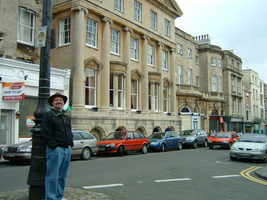|
American Abroad
by
Bob Wieman
(University of Bristol, UK)
|
 |
| Bob Wieman |
I'm writing this over breakfast in Aussois, France -- a little
village in the French Alps -- at a geomaterials conference. The
scenery is unbelievable: looking out the window is like looking at a
life size postcard or a backdrop from "Heidi". Yesterday it rained
here in the valley, and now all the mountains are capped with
snow.
I mention this because it highlights what I think is the biggest
difference between postdoctoral positions in the US and abroad.
Working in England means that conferences might be in France, Russia,
Spain, or Poland (In the past year I've been to conferences in the
first two, and other postdocs have been to the other two). Other than
the exotic locations, these aren't too different from meetings in the
States, except that I'm liable to overhear conversations that I don't
understand more than a few words of. (Although, now that I think about
it, that's happened at US conferences too.)
I got my doctorate from North Carolina State a little over a year ago,
investigating models of granular materials, like wheat flowing
out of silos. A year before that, I was applying for postdoctoral
positions. My impression is that they're pretty competitive, so I
didn't want to limit my choices, but I was concentrating on the East
Coast. Then an opportunity fell in my lap that made me think about
working much further afield.
An email advertising a couple of research positions at the
University of Bristol made its way to my advisor,
Michael Shearer. (In the UK, they refer to research
postdocs as "research assistants", which I'm used to thinking of as
referring to graduate students.) Since one of the positions was for
granular materials research, he encouraged me to apply for it. He's
from England himself, so the idea of hopping across the Atlantic to
pursue a career probably didn't strike him as a big step.
My fiancée (now wife) was keen on me going to
the interview, because it was a free trip to England. When they
offered me the job, though, that required some more serious thought.
We didn't have too long to think about it. Unlike the US where each
candidate is interviewed on a different day, in the UK typically all
candidates are interviewed over a couple of days and an offer is made
immediately. We decided that if we could fit our lives around it,
spending three years in England was an opportunity to see more of
Europe than we ever would otherwise. Fortunately, my wife's postdoc
(she got her PhD two years before me) let her telecommute from
England. She is now searching for a job over here. Because she is
here as my "dependent" she doesn't require her own work
permit.
 Bob in Clifton,
Bristol. Bob in Clifton,
Bristol. |
Advances in technology have made living in England
much easier for us in other ways too. In particular email, instant
messaging, and the low international telephone rates have kept us in
touch with our friends and family more than I think we could have even
a few years ago. As a result, I don't feel any further away from
folks back home than if they lived a few states away. We've found
that it isn't too hard to convince people to come visit, whether just
to see us and England, or as part of a larger European
vacation. |
As far as actual work goes, I've been struck by how similar it is
with what I imagined a US postdoctoral research job to be like. The
department facilities are the same as what I expected in the US -- a
faster computer than what I had access to as a grad student (two
processors, dual boot, more storage memory than I'm ever going to use,
that kind of thing). The income (for professors as well as postdocs)
is less than in the US, but for me that's somewhat offset by not
having a car and walking to work. My "line manager" (postdoctoral
advisor) is keen for me to convert my thesis into published papers, to
start growing my CV, just like a US advisor would. This year, I've
asked for and received an opportunity for some teaching experience,
just like I'd hope to have in the US. The common topics of
conversation among the faculty are echoes of what I've heard in
American universities: debates over the preparedness of the incoming
students, which departments are getting the short end of the stick,
someone's office being too hot or too cold.
If you're thinking about doing postdoctoral work abroad, I'd
recommend it for two reasons. One is just the experience of living in
another country. It feels like I'm on vacation even on the way to
work! You get to see another country close up, as well as to see
America from the outside, both of which are worthwhile. The other
reason is that, even with the internet and the adoption of English as
a nearly universal research language, there is still a separation
(figurative as well as literal) between researchers on different
continents. The researchers in my department at Bristol typically go
to one or two conferences in the US each year, and I'd be surprised if
many American researchers go out of the country more often than that.
As a result, I think a lot of important ideas are being pursued in
parallel, without benefiting from collaboration as much as they could.
Working overseas gives me the chance to meet with authors of books and
articles that I might otherwise never see in person.
So, if you can find a place to store your belongings for a couple
of years, I'd definitely recommend taking the plunge and going for a
postdoc in a foreign country. As everyone said to me when I was
leaving "You're young, what a great time you'll have." It's certainly
been true so far.